Sep 4, 2023
IELTS Speaking
IELTS Speaking Part 2 : Vacations and Holidays
🔵PART 1 (Speaking)
✨ What was your favorite vacation?
You should describe:
✅Where you went
✅Who you went with
✅What you did there
✅And why you enjoyed it
Or you can describe a dream vacation that you'd like to take in the future. You should describe:
✅ Where you will go
✅ Who you will go with
✅ What you will do there
✅ And why you would like to go there
Spend a minute or two describing your favorite vacation
🔵PART 2 (Reading)
✨ Sample Answer ✨⬇️ Try reading for vocabulary, pronunciation, grammar, and expressions
I’d like to talk about a holiday that I took to the south coast of England just two months ago. I went to a small village in a coastal region called Cornwall. It’s really well known for its dramatic coastal scenes, stunning landscape and also for its tasty food. I went with my parents who had never been to this area of England before. They’d always wanted to go but just never had the chance because of work commitments. Anyway, Cornwall is quite far from where we live so we decided that it would be better to fly there rather than take the car. The roads and traffic are notoriously bad in that part of England. On our arrival, when we found got to the little village, we found our way to the cottage we had booked which overlooked the sea. I can’t overstate just how picturesque it was. It was quite gorgeous. The windows of my room overlooked a little harbour and I could see all the boats coming in and out and all the seagulls flying around.
We spent most of our holiday sightseeing. We visited all the local towns and villages and tried most of the local delicacies such as fresh crab and lobster. My father is a keen fisherman so he did a bit of fishing while my mother and I relaxed in little cafés somewhere just chatting with locals. It was so relaxing.
I think the thing I’ll remember most about the holiday, will be just how friendly and welcoming all the locals were. It felt like home away from home. By the time we’d finished the two week holiday, we had made loads of friends and I’m sure we’ll all keep in touch. If I ever get the chance to go back, I’d love to go and possibly stay longer, maybe for a few months. There’s still so much of the countryside that we didn’t explore, so there’ll still be plenty to see when we return.
IELTS Writing Tips : Task 1
On the first writing task, aim for an essay of nine to eleven sentences. You can break it down like this:
Introduce the topic: 1 sentence
Summarize your essay: 2 sentences
First detailed paragraph: 3-4 sentences
Second detailed paragraph: 3-4 sentences
This is the structure that you should follow. Writing it like this helps you organize your thoughts and fits the natural structure of process descriptions in the real world.
But how do you get better at writing descriptions of data or processes? Here, you can take a hint from newspapers.
Newspapers are an excellent resource, because they have to do two things.
First, they have to grab people’s attention. Graphs and visual information sources are a good way to do this.
Second, they have to explain the graphs they use as quickly as possible. Space in a newspaper is very limited, so they have to choose only the most relevant data.
Look at the data that they choose. Why did they choose it? What sorts of patterns can you see from the data types they choose to discuss? Cover the descriptions of the tables and try to predict what data the journalists will be talking about. Once you can tell just by looking at it, you will know that you have sufficiently developed this skill.
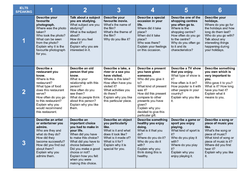
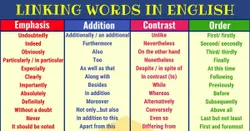
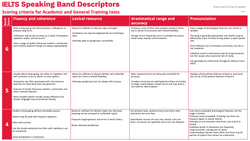
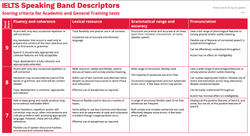
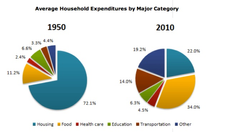

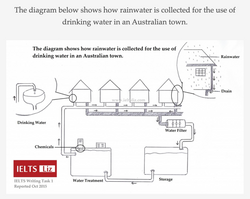
Model Answer: Rainwater Collection
The diagram illustrates how an Australian town collects rainwater to process in order to use as drinking water. Overall, rainwater collected from houses can be used for drinking after it has been processed by being filtered and then being treated with chemicals.
Initially, the rain which falls on the rooftop is collected by the gutter and then runs down the pipe at the side of the house into the drain at the bottom. Each house collects rainwater in this way and the rainwater is then passed along underground drains to the water filter.
The rainwater passes through the water filter to remove any impurities. Once it has been filtered, it continues along the pipes to a storage tank. From this point, the water goes from storage to the water treatment. At this stage of the process, the water is treated with chemicals in order to make it fit for consumption. When the water is ready for drinking, it travels along pipes that lead back into the houses in the town where people can use the water for daily consumption.
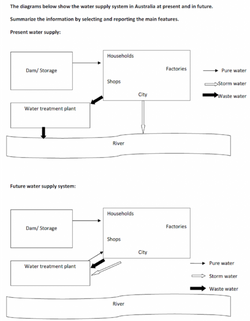
IELTS Common Mistakes : Task 1
Common Weaknesses in Writing Task 1:
-Starting too quickly. Many people make the mistake of immediately beginning their summary when they see the graph, only to realize that they have cited unneeded data. Take a second and figure out what you’re going to say.
-Not knowing what types of graphs might appear. I have noticed a tendency for test-takers to take two practice exams with one type of graph in them and then think that task 1 will be easy. Take your time to acquaint yourself with all the types of graphs - you will thank yourself for it. Lists of these graphs are widely available on the Internet, and reproducing them here would be a waste of space.
-Paraphrasing badly. Practice paraphrasing the question. You do not need to write entire essays for each practice question you paraphrase, but you should paraphrase a lot of questions.
-Not practicing comparisons. You are going to need to compare different things on task 1. Take some time and find real world examples of comparisons. What expressions do they use? What could you find useful?
-Not using the passive voice well. I know, passive voice is generally considered to be bad style. I dislike using it personally, but it can be very useful when describing processes (not graphs). If you do not know the passive form of a verb, try rephrasing the process so that you can use a verb you know. Instead of “the meat is ground in a machine” you could say “the meat is put into a grinder”.
Model Answer: Australian Water Supply System
The diagram illustrates the way the water supply system currently works in Australia and the plans for future changes. Overall, the main change in the future water supply system is based on recycling water for use in the city.
The current water supply system shows that pure water is stored in a dam before being transferred to a city to be used by households, shops and factories. From the city, storm water is directed straight into the river whereas waste water is sent to the water treatment plant to be processed. After the waste water is treated, it is safe to be released into the river.
Regarding the future water supply system, it can be seen that the storage of pure water in the dam and the uses of it in the city are the same as the previous system. However, both the storm water and waste water from the city are to be directed to the water treatment plant for processing after which they will both be recycled back for use in the city. It is planned that no water will be released into the river.

IELTS Speaking Part 3 : Travel
Now I’d like to talk more about holidays and travelling.
✨1. If you had the chance to travel anywhere, where would you go?
That’s really difficult for me to answer because there are so many places I’d like to go to. But I suppose, if I had to pick a place, I’d choose India mainly because of the incredible landscape and also because of the fascinating culture there. I always like to go to countries which have a rich culture steeped in history and India certainly has that. I think I’d be blown away by the colours, the sounds, the aroma of amazing food and by the local people. I’ve heard that the locals are very welcoming and hospitable to foreigners. I think going to India would be a dream come true for me.
✨2. Why do you think some people like to travel alone?
Well, I suppose one reason could be that when you travel alone, you are completely free to do exactly what you want. You don’t need to consider anyone else when you’re planning your itinerary or when you change it. It can be quite annoying not to be able to do exactly what you want when you’re on holiday. Also, another reason why some people might prefer travelling alone is that it’s easier to make friends and meet people. What I mean is, other people are much more likely to start chatting to you when you’re on your own than if you are already with someone. So, travelling on your own can be more exciting and more interesting.
✨3. Do you think travel has changed much over the last few decades?
Yes, I do. It’s changed beyond all recognition really. In the past, only wealth people were able to travel, not only because of the expense but also because of the time it took to travel long distances – you know it could sometimes take days to go from one culture to another. They would either have to travel over land or by sea. Nowadays, of course, there are budget flights all over the world and anyone can afford to travel. Travel has become so cheap that it’s often cheaper to travel abroad than in your own country. So, not only is it easier to travel, it is also more accessible to the average person.
✨4. How does travel change people?
I guess it changes people in a number of different ways. For the individual traveller, it gives them a chance to learn about how other people live and other cultures. This helps them to become more tolerant and accepting of differences which is really important nowadays in a time when there is so much tension between cultures and religions. Also travel can affect the local cultures a lot. What I mean is, it brings foreigners to more remote places in the world where previously there was little outside contact. This can change the way they earn money and the type of work they do as instead of doing traditional jobs, they focus more on making money from the tourist industry. I think that’s quite a worry actually, because if there’s a sudden drop in the number of people travelling, local cultures will suffer as a consequence.
✨5. Do you think there are any disadvantages to modern travel?
Yes, for sure. I think the main drawback is of course pollution, air pollution. Because there are so many budget flights these days, it has really increased the number of people travelling by plane and the number of flights each day. This has led to serious problems with air pollution which affects the entire world not just the country with the most flights. So, I think this is a major world problem and really needs to be addressed either by reducing the number of flights or finding a cleaner energy source. Another disadvantage is that people are able to move so easily from one country to another that they almost forget their in a new country. I mean, if you take Thailand as an example, many tourists are so busy just having fun and doing what they want, that they forget they are in a relatively traditional culture and they act and dress inappropriately. I think that really is quite a disadvantage of modern travel.
IELTS Speaking Part 1 : Home
✨ 1. Do you live in a house or a flat?
Why did you choose one over the other?
Answer = I live in a flat. I chose to live in a flat rather than a house for several reasons. One of the main reasons is convenience. My flat is in a central location, which makes it easy for me to get to work and access various amenities like shops and public transportation. This is really important for me because I have a busy schedule and need to save time on commuting.
Another reason I prefer a flat is that it requires less maintenance compared to a house. In a flat, the building management handles most of the upkeep, like fixing any issues with the building or cleaning common areas. This is quite convenient for me, as I don't have to spend a lot of time and effort on these tasks.
✨ 2. Which is your favourite room and why?
My favourite room in my home is definitely the kitchen. It’s not just a place for cooking; it’s where I unwind and get creative. I love experimenting with new recipes and ingredients, so the kitchen feels like my own little laboratory.
✨ 3. Can you describe it?
The open layout makes it easy to move around, and the large windows let in plenty of sunlight, which brightens my mood, especially in the morning. I also appreciate the modern appliances we have, which make cooking a more enjoyable and efficient experience. It’s a space that brings both comfort and inspiration, which is why I spend so much time there.
✨ 4. If you could improve one thing in your house, what would it be and why?
If I could improve one aspect of my house, it would definitely be the bathroom. Currently, it’s quite small and lacks natural light, which makes it feel cramped and dim. I would like to expand the space and add a skylight to bring in more daylight, creating a brighter and more inviting atmosphere. Additionally, I would upgrade the fixtures to more modern designs and perhaps install a larger bathtub. These changes would make the bathroom more comfortable and luxurious, turning it into a relaxing space where I could unwind after a long day.
Well, if I could change just one thing, I’d probably choose to change my bedroom. At present it’s rather small with almost no view at all. If I could alter it in any way, I would enlarge it to have a private study area, where I could do some work, and I would improve the view by planting some lovely trees and shrubs outside the window. I think being able to sit at a window and see nature is really important.
IELTS Speaking Part 1 : Films
✨1. Do you enjoy watching films?
Oh yes. I’m a bit of a film fanatic actually. I watch films most weekends and quite often during the week as well. I much prefer films to TV programs.
✨2. What kinds of films do you like most?
I really like a wide variety of film genres. But if I had to choose a type of film. I’d say I mainly go for suspense, psychological thrillers. In fact some of my favourite films are the old Hitchcock films – he really was the master of suspense.
✨3. Did you watch much TV as a child?
No, I didn’t. My parents encouraged us, that’s my brothers and me, to spend time outdoors rather than sitting inside watching TV. So we only ever had the chance to watch TV for an hour each evening before we went to bed. I can’t say it was very common because most of my friends watched loads of TV.
✨4. Are foreign language films popular in your country?
No, they’re not really that popular compared to domestic films. I mean there are some Asian films from India and China, as well as some films from Europe as well but I think having to read the subtitles puts people off watching them. It’s a shame really because I think it’s important for people to watch more foreign language films in order to learn more about other cultures.
Dialogue 1 - Family
Read the dialogue, and answer the interviewer’s questions
Interviewer: We are going to talk about your family - Can you describe your family?
Stacey: I don't have a very big family, both my parents are only children. I have two siblings - an older sister and a younger brother. We are quite close as a family. I moved out when I went to university but I still live quite close to them and so I pop in during the week to see them.
Interviewer: Who do you get along with best in your family?
Stacey: Probably my older sister now. She settled down and got married a few years ago so I don't see here as often as I would like to. I used to get along really well with my grandmother, but she passed away when I was twenty. She was always there for me when I was growing up, I always knew I could count on her if I needed anything.
Interviewer: Which one of your parents are you most like?
Stacey: I definitely take after my father, we're both very impatient and hot tempered!
That is why we argue a lot (haha)
Interviewer: Ha...and who is the peacemaker during family arguments?
Stacey :Definitely my mother! When we were teenagers, my older sister was always sneaking out late at night. We shared a room and my father would barge in to check if my sister was there. If she wasn’t he would get angry at me for not telling him and my mother was always the one to calm him down. Even now, whenever we fall out, she's the mediator - for example, every Christmas it seems someone brings something up to start an argument over lunch, and my mother always finds a way to stop the argument.
Beginner Level:
1. Daily Routines: What do you usually do in the morning? What is your favorite part of the day?
2. Food: What is a popular dish in your country? Do you have a favorite food?
3. Family: How many people are in your family? Do you have any siblings?
4. Hobbies: What do you like to do in your free time? Do you play any sports or games?
5. Weather: What is the weather like in your country? Do you prefer hot or cold weather?
6. Music: What kind of music do you like? Can you sing or play any instruments?
7. School/Work: What do you study or what is your job? Do you enjoy it?
8. Travel: Have you traveled to any other countries? Where would you like to go?
9. Celebrations: What is your favorite holiday? How do you celebrate it?
10. Animals: Do you have any pets? What is your favorite animal?
Upper Intermediate Level:
1. Cultural Differences: What cultural differences have you noticed when interacting with people from other countries? How do you adapt to them?
2. Work-Life Balance: How important is work-life balance in your country? What do people do to maintain it?
3. Tradition vs. Modernity: How is your country balancing traditional values with modern changes? Are there any conflicts between the two?
4. Social Issues: What are some pressing social issues in your country? How are people addressing these problems?
5. Health and Wellness: What are the most common ways people in your country stay healthy? How do attitudes toward health differ between cultures?
6. Education and Careers: How do people in your country choose their careers? Is higher education considered essential, or are there alternative paths to success?
7. Technology in Daily Life: How has technology changed the way people live in your country? Are there any downsides to these changes?
8. Media and News: How do people in your country consume news? Is the media generally trusted, or do people look for alternative sources of information?
9. Environmental Responsibility: What environmental practices are common in your country? How are individuals and businesses contributing to sustainability?
10. Language and Communication: How important is English in your country? Do people see it as an essential skill for the future?
11. Global Perspectives: How do people in your country view global issues such as climate change, human rights, or international trade? Do these views differ from other countries you know of?
12. Personal Values: What are the most important values in your culture? How do they influence people’s decisions and behaviors?
13. Travel and Tourism: How has tourism affected your country? Are there any cultural or environmental concerns related to it?
14. Entertainment and Leisure: What forms of entertainment are popular in your country? How do they reflect the culture?
15. Future Aspirations: What are the most common aspirations for young people in your country? How are they working to achieve them?
Intermediate Level:
1. Cultural Traditions: What are some important traditions in your country? How do they compare to others you know?
2. Languages: How many languages do you speak? Is English difficult to learn for you?
3. Technology: How has technology changed life in your country? Do you think it’s a good change?
4. Friendship: How do you make friends in your country? What do you think is important in a friendship?
5. Environment: What environmental issues are important in your country? How can people help protect the environment?
6. Fashion: What kind of clothes do people like to wear in your country? Do you think fashion is important?
7. Media: What TV shows or movies are popular in your country? Do you have a favorite?
8. Education: What is the education system like in your country? How is it different from other countries?
9. Dreams and Goals: What are your future plans or dreams? How are you working to achieve them?
10. Global Issues: What global issues do you think are important? How can countries work together to solve them?
Here are some interesting questions along with sample answers that could achieve a Band 8.
1. Describe a memorable trip you took.
Question: Can you describe a memorable trip you took?
Answer:
“One of the most memorable trips I’ve taken was a road trip across the western coast of the United States. We started in San Francisco, where we marveled at the iconic Golden Gate Bridge and explored the eclectic neighborhoods. As we drove down the Pacific Coast Highway, the scenery was absolutely breathtaking. The rugged cliffs, the endless ocean, and the picturesque towns we passed through left a lasting impression on me. I particularly enjoyed our stop in Big Sur, where we hiked through towering redwoods and enjoyed panoramic views of the coastline. The trip was not just about the places we visited, but also about the sense of freedom and adventure that came with it. It was a perfect blend of natural beauty and cultural exploration, making it a journey I’ll never forget.”
2. Discuss a time when you had to make a difficult decision.
Question: Can you tell me about a time when you had to make a difficult decision?
Answer:
“A difficult decision I had to make was when I had to choose between staying in my hometown with my family and friends or moving to a new city for a job opportunity. The job was a significant step forward in my career, but it meant leaving behind everything familiar. After a lot of deliberation, I decided to take the job and move to the new city. It was challenging at first, adapting to a new environment and building a social circle from scratch. However, in retrospect, it was the right decision. The job provided me with incredible growth opportunities and broadened my horizons. It also taught me the importance of stepping out of my comfort zone to pursue my long-term goals.”
3. Describe a skill you would like to learn.
Question: What skill would you like to learn, and why?
Answer:
“I’ve always been fascinated by the idea of learning a musical instrument, particularly the piano. The piano has such a versatile range, and I believe mastering it would allow me to express emotions in a way that words often cannot. Additionally, learning the piano would enhance my appreciation for music, giving me a deeper understanding of rhythm, melody, and harmony. It’s a skill that requires discipline and patience, and I think the process of learning it would be incredibly rewarding. Furthermore, playing the piano could be a wonderful way to relax and unwind, providing a creative outlet that balances my often hectic lifestyle.”
4. Discuss the impact of technology on communication.
Question: How has technology changed the way we communicate?
Answer:
“Technology has revolutionized the way we communicate, making it faster, more convenient, and accessible to people around the world. With the advent of smartphones, social media, and instant messaging, we can stay connected with loved ones regardless of distance. However, this ease of communication has also led to a shift in how we interact. Face-to-face conversations are sometimes replaced by text messages or video calls, which, while convenient, lack the depth and nuance of in-person interactions. Additionally, the prevalence of social media has created a paradox where we are more connected yet often feel more isolated. Despite these challenges, technology has undeniably expanded our ability to communicate and share ideas on a global scale.”
5. Talk about a book that influenced you.
Question: Can you describe a book that has had a significant impact on you?
Answer:
“A book that profoundly influenced me is To Kill a Mockingbird by Harper Lee. The novel’s exploration of moral courage, racial injustice, and the loss of innocence resonated deeply with me. Through the eyes of Scout Finch, the protagonist, I was introduced to the complexities of human nature and the importance of standing up for what is right, even in the face of overwhelming opposition. The character of Atticus Finch, in particular, became a role model for me in terms of integrity and empathy. The book not only opened my eyes to social issues but also inspired me to reflect on my own values and actions. It’s a timeless story that continues to shape my perspective on life.”
Tips for Achieving a Band 8:
• Fluency and Coherence: Speak fluently without too many pauses. Organize your ideas logically and connect them well.
• Lexical Resource: Use a wide range of vocabulary, including less common and idiomatic expressions. Paraphrase when necessary.
• Grammatical Range and Accuracy: Use a variety of grammatical structures accurately. This includes complex sentences, conditionals, and passive voice.
• Pronunciation: Pronounce words clearly and correctly. Pay attention to intonation, stress, and rhythm to ensure natural speech.
A1 Q&A
1. What did you do last weekend?
• Answer: “Last weekend, I went to the park with my family. We had a picnic with sandwiches and juice. The weather was sunny, so we played some games, like frisbee and football. I also took a lot of pictures of the trees and flowers. After the park, we went to a café and had ice cream. In the evening, I watched a movie at home with my brother. It was a comedy, and we laughed a lot. On Sunday, I relaxed and read a book. I had a great weekend!”
2. Can you describe your daily routine?
• Answer: “I usually wake up at 7:00 AM. First, I brush my teeth and take a shower. Then, I eat breakfast. I like to eat cereal and drink coffee. After breakfast, I go to work. I take the bus, and it takes about 30 minutes. I work from 9:00 AM to 5:00 PM. After work, I go to the gym for one hour. I do some exercises to stay healthy. In the evening, I cook dinner and watch TV. Finally, I go to bed around 10:00 PM.”
3. Tell me about your family.
• Answer: “I have a small family. There are four people: my mother, father, brother, and me. My mother is a teacher, and my father works in an office. My brother is younger than me; he is 10 years old. We all live together in a nice house. On weekends, we like to do things together. Sometimes, we go to the movies or visit my grandparents. We also enjoy playing board games at home. My family is very important to me. We always support and help each other.”
4. What is your favorite hobby?
• Answer: “My favorite hobby is painting. I love to paint pictures of nature, like trees, mountains, and rivers. I started painting when I was a child. I have many colors and brushes at home. When I paint, I feel relaxed and happy. I usually paint on weekends when I have free time. Sometimes, I give my paintings to my friends as gifts. They say my paintings are beautiful. Painting is a special hobby for me.”
5. What is your favorite place to visit?
• Answer: “My favorite place to visit is the beach. I love the sound of the waves and the smell of the ocean. I go to the beach every summer with my friends. We swim in the water and play volleyball on the sand. We also like to build sandcastles and collect seashells. At the beach, I feel free and happy. We stay until the evening to watch the sunset. The colors in the sky are so beautiful. The beach is the best place to relax and have fun.”
Choose a question. For speaking practice, try answering it. For reading practice, try reading the sample answer.
🔵1. How much free time do you usually have?
“I usually have around two to three hours of free time each day. Most of my day is spent at work or school, so I don’t have a lot of free time. After I finish my responsibilities, I try to relax and do things I enjoy. Sometimes, I watch a movie, read a book, or go for a walk. On weekends, I might have more free time, maybe five or six hours, because I don’t have to work. I like to use this time to meet friends or visit my family. Free time is important to me because it helps me recharge. Without it, I would feel too tired or stressed. I try to balance my time between work and relaxation. This way, I can stay happy and healthy.”
🔵 2. How important is time to you?
“Time is very important to me because I have many things to do every day. I need to manage my time well so I can complete all my tasks. If I don’t plan my time, I might forget something or feel stressed. I believe that time is one of the most valuable things we have. Once time is gone, we can’t get it back, so I try to use it wisely. I also think it’s important to spend time with family and friends. They are important in my life, and I don’t want to miss out on special moments. I also need time for myself, to relax and do things I enjoy. In the future, I want to be better at managing my time. This will help me achieve my goals and be more successful.”
🔵 3. If you had more free time, what would you do?
“If I had more free time, I would like to travel more. There are many places I want to visit, like new cities or countries. I would also spend more time learning new skills, such as cooking or a new language. It would be nice to have time to exercise more often, maybe go to the gym or take up a sport. I could also use this extra time to spend with my family and friends. We could go on trips together or just hang out and have fun. Another thing I would do is read more books. Reading helps me relax and learn new things. I sometimes feel like I don’t have enough time to do everything I want. Having more free time would allow me to enjoy life more.”
🔵 4. “Time is money.” Do you agree or disagree? Why?
“I agree with the saying ‘Time is money’ because time is a very valuable resource. When we use our time well, we can achieve our goals and even earn money. For example, if I spend time working or studying, it can help me get a better job in the future. But if I waste time, I miss opportunities to improve myself or my situation. Just like money, once time is spent, we can’t get it back. So, it’s important to think carefully about how we use our time. I also think that time can be more valuable than money because time affects our happiness and well-being. If we don’t have time for ourselves or our loved ones, we might feel unhappy. That’s why I believe it’s important to balance how we use our time.”
🔵 5. How do you feel about time that is wasted?
“I feel frustrated when I waste time because I could have used that time to do something important. Sometimes, I get distracted by things like social media or TV, and then I realize I’ve spent hours doing nothing useful. It makes me feel guilty because I know I could have been more productive. For example, I could have finished my homework or cleaned my room instead. When I waste time, I also feel like I’m missing out on other things I enjoy. I could have spent that time with friends or doing a hobby I like. I try to remind myself to stay focused and use my time wisely. But I know it’s normal to waste time sometimes, so I try not to be too hard on myself. I think it’s important to learn from these moments and do better next time.”
Grammar : Conditionals
1. How often do you go to restaurants?
“I usually go to restaurants once or twice a week. If I have a busy week, I might not go at all. But if I had more free time, I would go more often. Last weekend, I would have gone out to eat, but I was too tired. If I want to try something new, I go to a restaurant that offers different cuisines. If I hadn’t spent so much money last month, I would have gone to a more expensive restaurant. When I have guests visiting, I always take them out to eat. If it rains, I might order food from a restaurant instead of going out. I like the convenience of eating at restaurants because it saves time. If I keep going to restaurants so often, I might have to start cooking more to save money.”
2. What is your favorite restaurant? Why?
“My favorite restaurant is a small sushi place near my home. If you like sushi, you would love this restaurant. The food is always fresh, and the staff is very friendly. If I had more money, I would eat there every week. Last month, if I hadn’t been so busy, I would have visited the restaurant more often. When I go there, I usually order the chef’s special, which is always delicious. If I ever move to a different city, I would miss this restaurant a lot. If the restaurant were open 24 hours, I would probably go there late at night sometimes. The atmosphere is cozy, and if you want a quiet place to eat, this is perfect. If you haven’t been there yet, you should definitely try it.”
3. What do you usually order at a restaurant?
“When I go to a restaurant, I usually order something I don’t cook at home. If I’m at an Italian restaurant, I’ll order pasta or pizza. But if the weather is cold, I might order soup to warm up. If I had a choice, I would always order dessert at the end of my meal. Last week, if I hadn’t been in a hurry, I would have stayed longer and ordered more food. If the restaurant has a good reputation, I might try their specialty dish. If I were a chef, I would create my own unique dishes to order at a restaurant. When I’m not very hungry, I’ll order something light like a salad. If I could, I would eat sushi every time I go out. If I don’t see anything I like on the menu, I might just order a drink.”
4. What is the restaurant experience like in your country?
“In my country, going to a restaurant is a popular activity, especially on weekends. If you visit a restaurant here, you’ll notice that the service is usually friendly. If you want to try traditional food, there are many restaurants that offer it. If I had more time, I would explore different restaurants to compare their experiences. Last month, if I hadn’t been so busy, I would have visited a new restaurant that opened nearby. If you’re looking for a fancy dining experience, there are some high-end restaurants as well. When people celebrate special occasions, they often go to restaurants. If you don’t like crowded places, you might want to avoid restaurants during peak hours. If I could change one thing, I would make restaurant prices more affordable. If you ever come to my country, you should definitely try our local restaurants.”
5. Have you ever worked in a restaurant?
“No, I’ve never worked in a restaurant, but if I had, I think it would have been a good experience. If I ever work in a restaurant, I’ll make sure to learn as much as I can. I imagine it’s a tough job, but if I were younger, I would probably try it. If I had worked in a restaurant before, I would have gained valuable skills like teamwork and customer service. When my friend worked in a restaurant, she said it was challenging but rewarding. If I had to work long hours, I might find it stressful. If I were a restaurant worker, I would make sure to always be polite to customers. If I hadn’t chosen my current job, I might have considered working in a restaurant. If I ever get the chance, I would like to try working as a waiter for a short time. If you’ve ever worked in a restaurant, you probably know how demanding it can be.”
6. If you owned a restaurant, what kinds of food would you serve?
“If I owned a restaurant, I would serve a mix of international and local dishes. If customers wanted something different, they could try the international options. I would make sure that everything is made from fresh ingredients. If I had a talented chef, I would ask them to create unique dishes. Last year, if I had saved more money, I might have already started planning my own restaurant. If I were to open a restaurant, I would also offer vegetarian and healthy options. If I had owned a restaurant during the pandemic, I would have offered delivery services to keep the business running. When people come to my restaurant, they would find a friendly atmosphere. If my restaurant were successful, I would think about opening more locations. If you ever visit, you would find something delicious to eat, no matter your taste.”
The Missed Train (conditionals)
David was always punctual, never late for anything. He believed that being on time was the key to success. One morning, he was running late because his alarm didn’t go off. If his alarm had rung, he would have caught the early train as usual. As he rushed to the station, he thought, “If I miss this train, I’ll be late for my important meeting.” When he arrived, the train doors had just closed, and he watched it pull away. Frustrated, David muttered, “If only I had left home five minutes earlier, I wouldn’t be in this situation.”
While waiting for the next train, David noticed a woman sitting nearby, looking upset. If he hadn’t missed his train, he wouldn’t have noticed her at all. He hesitated but then decided to ask if she was okay. The woman, named Emma, explained that she had just lost her job. David offered some words of encouragement, telling her, “If I were in your position, I’d probably feel the same way, but I’m sure something better is waiting for you.”
They continued talking and discovered they had a lot in common. If David hadn’t missed his train, he never would have met Emma. The next train arrived, and they sat together, chatting the entire ride. By the time they reached their destination, David had almost forgotten about his missed meeting. “If I hadn’t been late this morning, I wouldn’t have had this unexpected and wonderful conversation,” he realized.
A few weeks later, David received a thank-you note from Emma, saying she had found a new job and that their conversation had given her hope. He smiled, thinking, “If I hadn’t missed that train, I would have never known how much a small gesture could mean to someone else.” Now, David no longer worries so much about being late, understanding that sometimes, timing works out in ways
Here are some tips to help you prepare for the IELTS Speaking portion:
1. Understand the Test Format:
• Part 1: Introduction and interview (4-5 minutes). You will be asked questions about yourself, your home, family, work, studies, and interests.
• Part 2: Long turn (3-4 minutes). You will speak on a topic for 1-2 minutes, with 1 minute to prepare.
• Part 3: Discussion (4-5 minutes). You will discuss more abstract ideas related to the Part 2 topic.
2. Practice Speaking Regularly:
• Engage in English conversations daily.
• Practice speaking on common IELTS topics like hobbies, travel, education, work, and technology.
3. Expand Your Vocabulary:
• Use a wide range of vocabulary, but avoid using words you’re not comfortable with.
• Practice using idioms and phrasal verbs, but ensure they fit naturally into the conversation.
4. Focus on Fluency and Coherence:
• Speak clearly and at a natural pace.
• Organize your thoughts logically. Use linking words and phrases to connect your ideas.
5. Improve Pronunciation:
• Work on your intonation, stress, and rhythm.
• Practice with recordings of native speakers and mimic their pronunciation.
6. Answer Fully and Clearly:
• Avoid one-word answers. Provide explanations, examples, and reasons for your responses.
• Don’t be afraid to express your opinion, even if you’re unsure about the topic.
7. Use the 1-Minute Prep Time Wisely (Part 2):
• Make quick notes on key points you want to cover.
• Plan the structure: introduction, key points, and conclusion.
8. Stay Calm and Confident:
• Take a deep breath before you start speaking.
• If you make a mistake, don’t panic. Correct yourself and continue.
9. Be Honest and Natural:
• Speak naturally as if you’re having a conversation, not delivering a speech.
• It’s okay to pause briefly to think, but avoid long silences.
10. Practice with a Timer:
• Time your responses to ensure you’re speaking for the appropriate length of time.
• This helps you get used to managing your time during the test.
11. Familiarize Yourself with Common Topics:
• Research common IELTS speaking topics and practice answering them.
• Examples include the environment, education, technology, travel, and health.
12. Listen to the Examiner’s Questions Carefully:
• Make sure you understand the question before answering.
• Ask for clarification if you didn’t catch something.
By incorporating these strategies into your practice, you’ll improve your speaking skills and feel more confident on the test day.
1. Have you ever traveled to another country? Where did you go?
Sample Answer:
Yes, I have traveled to another country. Last year, I went to Spain. It was my first time in Europe, and I was very excited. I visited cities like Madrid and Barcelona. I saw many famous places, like the Sagrada Familia and the Royal Palace. The food was delicious, especially the paella. It was a great experience, and I hope to visit other countries in Europe soon.
2. What do you think is the most important thing to prepare before traveling abroad?
Sample Answer:
I think the most important thing to prepare before traveling abroad is your documents. You need a valid passport and sometimes a visa to enter another country. It’s also good to have a copy of your travel insurance. Without these documents, you may not be allowed to enter the country. I also think it’s important to know some basic phrases in the local language, so you can communicate with people.
3. What are some challenges you might face when traveling to a different country?
Sample Answer:
When traveling to a different country, one challenge might be the language barrier. If you don’t speak the local language, it can be hard to ask for directions or order food. Another challenge could be different customs or traditions. You need to be careful not to offend anyone by doing something that is normal in your country but not in theirs. Finally, the weather might be very different from what you’re used to, so you need to be prepared.
4. What countries would you like to visit in the future and why?
Sample Answer:
I would like to visit Japan in the future. I am very interested in Japanese culture, like their tea ceremonies and traditional clothing. I also want to see the cherry blossoms in the spring. Another country I want to visit is Canada. The nature there is beautiful, with big forests and lakes. I also have some friends in Canada, and I would love to visit them.
5. Do you think it’s better to travel to a country that is very different from your own? Why or why not?
Sample Answer:
I think it’s better to travel to a country that is very different from your own because you can learn more. When you go to a place that has different traditions, food, and language, you experience something new. It can be a bit challenging, but it’s also exciting. You see how other people live and understand the world better. It makes you more open-minded and gives you new ideas.
Mixed Questions : Answer the question, or read the answer
### Beginner Level
1. **What is your favorite food from your country?**
**Sample Answer:**
My favorite food from my country is sushi. It’s a traditional Japanese dish made with rice and fish. Sometimes, we add vegetables or eggs. Sushi is usually served with soy sauce and wasabi. I like it because it’s fresh and healthy. When I eat sushi, it reminds me of home.
2. **Do you prefer hot weather or cold weather?**
**Sample Answer:**
I prefer hot weather. I like when it’s sunny and warm. In hot weather, I can go to the beach and swim. I also enjoy wearing light clothes like shorts and t-shirts. Cold weather is not for me because I don’t like wearing too many layers of clothes. Hot weather makes me feel happy and energetic.
### Intermediate Level
3. **What is one cultural tradition from your country that you would like to share with others?**
**Sample Answer:**
One cultural tradition from my country that I would like to share is the Diwali festival. Diwali is a festival of lights celebrated in India. It marks the victory of good over evil and is a time for family and friends to come together. We light oil lamps, decorate our homes, and burst firecrackers. The festival also involves exchanging gifts and sweets. It’s a joyful time, and I think people from other countries would enjoy experiencing it.
4. **How has technology changed the way people communicate in your country?**
**Sample Answer:**
Technology has greatly changed the way people communicate in my country. In the past, people used to write letters or meet in person to talk. Now, most communication happens through smartphones and social media. Apps like WhatsApp and WeChat are very popular, and people use them to send messages, make video calls, and share photos. This makes communication faster and easier, especially with friends and family who live far away. However, some people feel that face-to-face conversations have decreased because of this.
### Advanced Level
5. **What are the challenges and benefits of living in a multicultural society?**
**Sample Answer:**
Living in a multicultural society has both challenges and benefits. One of the challenges is dealing with different cultural norms and values. For example, what is considered polite in one culture might be seen as rude in another. This can lead to misunderstandings and conflicts. However, the benefits are significant. A multicultural society promotes diversity, creativity, and a broader understanding of the world. People have the opportunity to learn from each other and appreciate different perspectives. It also encourages tolerance and helps break down stereotypes. Overall, the benefits of multiculturalism outweigh the challenges.
6. **How do you think climate change is affecting your country, and what should be done about it?**
**Sample Answer:**
Climate change is affecting my country in various ways. We are experiencing more extreme weather events, such as heavy rainfall, floods, and heatwaves. These changes are impacting agriculture, making it harder for farmers to grow crops. Rising sea levels are also a concern, especially for coastal areas. To address climate change, I think my country needs to invest more in renewable energy sources like solar and wind power. We also need to educate people about the importance of reducing carbon emissions. Governments should enforce stricter environmental regulations and encourage sustainable practices among businesses and individuals.
By undefined
29 notes ・ 342 views
English
Beginner